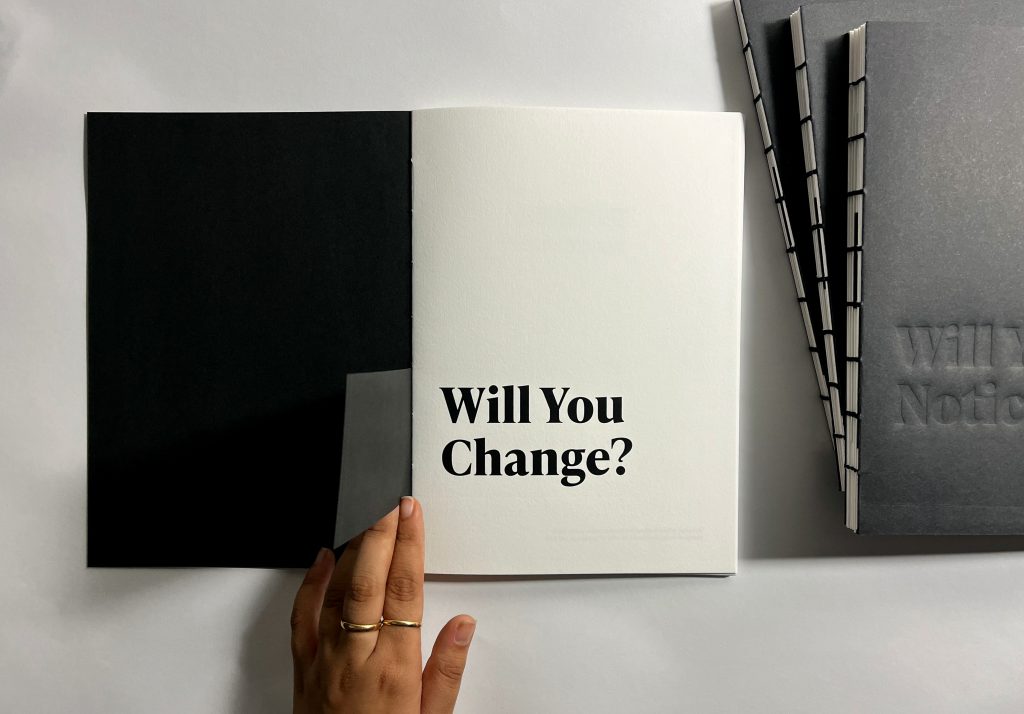From the Edges with… Aakifa Chida, Masters Degree in Design at AUT.
In our ‘From The Edges’ series we feature Aotearoa NZ Academic Design Projects.
Our practice as designers can be seen to be explored, pushed and perhaps become something entirely new where it exists at the edges of our practice in the world of academia. Free from the constraints of commercial outcomes and clients, designers explore and challenge existing paradigms.
In this article, we talk with Aakifa Chida about pursuing a Masters in Communication Design at AUT and the catalyst behind her upcoming exhibition from 21-23 July, Will you notice?, which focuses on how communication design can be used to inform, educate, and create social awareness around Islamophobia.
Exhibition opening night is 5pm on 21 July , St Paul st. galleries 1, 2, 3. More details below.
This article is proudly sponsored by AUT

What is your background and how did you get to where you are now?
My academic and practice background is in communication design. Throughout my degree and my journey as a designer, I developed a strong passion for creating work that attempts to make a positive impact and contributes to change in the real world. I found that the design work that I am most proud of always aligned with topics that I hold close to my heart. The open brief for my final undergraduate project was what inspired me to pursue a masters degree, so that I could continue to develop my knowledge and practice in the realm of design activism.
Can you give us some background on your current project?
My masters project focuses on how communication design can be used to inform, educate and create social awareness around Islamophobia. Given the importance of visual language in twenty-first century activism – my project showcases the manner in which design can be used to heighten, emphasise and encourage social awareness through a variety of deliverables that span across print and digital mediums.
Growing up in Aotearoa; I was no stranger to discrimination. Facing prejudice from a young age exposed me to the realities of social intolerance and isolation that come with being a Muslim. It also exposed me to how unaware and desensitised people may be of the impact that their words and actions can have. The objective of the project is to bring attention to how serious a matter Islamophobia is and show how dangerous it can be if left unhindered.

What were the catalysts or inspirations for your Masters Degree in Design project?
The main inspiration for my Masters project originated from my experiences as a Muslim woman. For as long as I have known, my community has constantly been associated with negative qualities, attributes and behaviour. Although I often normalised the prejudice that I endured, not realising my own desensitisation, deep inside I knew I always wanted to try and make a difference. It is my personal connection to the subject matter that inspires me most.
The catalyst that gave me the biggest push towards the area of my research rooted from pain and loss. When I was in the second year of my bachelor’s degree, the Christchurch Mosque tragedy occurred and shook me, my family and all the Muslims in New Zealand to our core. Nothing could have prepared us for a horrific incident like that, in which I lost multiple people who I had known personally my whole life. The shooting itself made me realise that extreme cases of Islamophobia are, in fact, a lot closer to home than I had thought. It was this realisation that drove me to use design as best I could to counter the hateful ideologies and mindsets that prompted the attack in the first place.

What was the most challenging part of your research thus far, and how did you overcome this?
The most challenging part of my research was the heaviness and magnitude of my chosen subject. I found that collating research, stories and information about violent and genocidial forms of Islamophobia deeply affected my emotional well-being at times. I also found it difficult to maintain motivation when being reminded – by myself and others – that a problem of this size cannot be eradicated overnight. I tried my best to detach myself from time to time when feeling overwhelmed and affirmed to myself that although I cannot change the world on my own, making a difference to even one person’s mindset is a huge success in itself.
Why did you choose this particular program/AUT to complete your Masters?
Completing my undergraduate degree in communication design at AUT really opened my eyes to how fulfilling, energetic and enjoyable studying can be. Specifically the studio culture; the bond that I built with my classmates and cohort in the final year of my degree was one thing I will never forget. I chose to pursue my Masters at AUT because I knew that when it came to my supervisors, my peers and my support systems – I was in good hands.

How has your Masters Degree impacted upon your own design practice?
My Masters degree has opened my eyes to so many possibilities and new opportunities. I have learned new skills, techniques, software; I am currently working with materials and processes that I had never touched before. This project has shown me that even if an outcome takes months to resolve, every stage of development is incredibly crucial. It has made me realise that when I keep passion and purpose at the centre of my practice, the tireless nights and constant hard work becomes so worth it in the end.
What are your goals and aspirations for the future?
My main aspiration for the future is to continue practice in design activism. One day, I hope to collaborate with other designers and organisations to create more meaningful practice. I want to build my experience, continue learning and one day teach in the same classrooms and studios that I was taught in.

How can people follow you or where can we see more of your own work?
You can see more of my work on my online portfolio and linkedin!
aakifachida.myportfolio.com/
linkedin.com/in/aakifa-chida/




